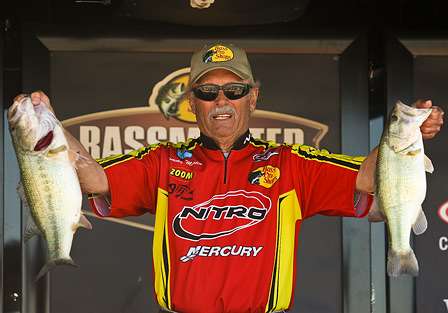
LEWISVILLE, Texas — Tommy Martin has lived quite nicely off his 1974 Bassmaster Classic title. It wasn't that the $15,400 winning paycheck — that's including daily lunker cash — made him rich. But being a Classic champ enriched his life.
"Back in 1974 to me, that's back in the stone ages of bass fishing," said Martin, fishing this weekend's Bass Pro Shops Bassmaster Central Open on Lake Lewisville. "People say you're a Classic winner, we're going to invite to this deal and you're going to fish in this. I've benefited for all those years from being a Bassmaster Classic winner.
"Now, I didn't win all that much money, I'd like to have won what Kevin won this last week and won $500,000. Things are a lot different now. There's a lot more money in the sport.
"After that, I had six more top 5 finishes. Of course back then we were fishing winner take all, so I didn't make a dime for any of those. If we could apply those to today's standards, I could have made some money."
Martin was a saltwater angler for years before moving to Hemphill in east Texas and started bass fishing at 30. Two years later, his angling skills helped him win the fourth-ever Classic. He definitely senses that he was among the pioneers of bass fishing, adding in the likes of Roland Martin, Rick Clunn, Ricky Green and "Larry Nixon, my best fishing buddy, George Cochran, my other best fishing buddy."
"All those guys, we paved the way kind of for these guys to do what they're doing today and make all this money," he said.
Today's Elite Series is a long way off from the day he totaled 33 pounds, 7 ounces to top Roger Moore on Alabama's Lake Wheeler in the 1974 Classic. Martin began fishing the circuit that year and was the first to win a regular-season event and the Classic in the same season. That was 36 years ago.
Fishing keeps him fit and active, but …
"My level of completion is not on top," Martin said. "I'm too old, I can't hear good, I can't see good, my coordination is not as good as it should be, but I'm still competitive at times."
Martin was in 17th after the first day on Lake Lewisville, catching only two fish for 8 pounds, 13 ounces, but one was a 5-plus that led big bass for awhile, so he's on good fish. He'd like to take the winner's automatic berth to the 2012 Classic, but qualifying for his 20th isn't why he's here.
"Making the Classic is not a goal, but if I made it I'd be awful tickled," he said.
A young Rick Clunn also made his first appearance in world championship in 1974, finishing 16th. Clunn went on to win a record four Classics that was just tied last week by VanDam. He's fishing this Open alongside Martin and said he's tried to emulate the tough Texan.
"Tommy and Elroy Kruger were, early in my career, probably my two biggest influences," Clunn said. "As time goes by, you realize you become pieces of all these guys who came before you, and that's what eventually creates the angler you are."
While Clunn said, along with humility and kindness, Bill Dance taught him "you don't have to be a redneck to be a good bass angler." Roland Martin showed Clunn it took a lot more skill than luck. Martin showed Clunn how to get after it.
"In my early days, when things got tough and hot, or it was cold, I always reminded myself, 'Tommy isn't slowing down. Elroy ain't slowing down.' He really inspired me on how hard you had to work … and not just for a little while, but all day long."
At 70, Martin said he's still in the business and has kept up with the technological advances, even working to upgrade sonar unit chips. He can't imagine what fishing would have been with such benefits in his heyday.
"Everything was different back then. My co-angler today said, 'How do you know right where to go. You must know this place awful well.' This is my first time on this lake. I'm following the GPS, it's taking me where I want to go in all this fog," he said. "I'm not running very fast because I don't want to have a collision with another boat, but I am going directly to the points that I want to go to.
"This is all because of GPS, which we did not have in 1974. We had a lot of fogged in tournaments. Back then, you kind of had to use your Indian skills to get around on the lake because there wasn't any of the gadgets we have today."
He said he remembers B.A.S.S. founder Ray Scott said that there would never be any engines larger than 75 horsepower on the boats.
"Ray made a little mistake. He doesn't make many but he did make a little one when he said that," Martin said. "He didn't think we'd have 200 and 250s ever on bass boats."
Martin is amazed at the Elites making two-hour runs at 70 mph to be first on spots, but accepts it "if you've got some fish to run to. I just went fishing today and that's what I'll do tomorrow. I just enjoy going out and competing."
He's booked to work this weekend at the Bass Pro Shop in Grapevine, but he'd rather make the top 12 cut and be lugging fish across the weigh-in stage there Saturday. The winner gets $10,000 and a $35,000 rigged boat, along with the Classic berth that could bring true riches.
"Unfortunately back then when I won, it only paid $15,000," Martin said. "At that point in time it was a lot of money. And I was proud to get it. I couldn't have been more happy. It's the biggest fishing achievement I've had in my life.
"I never fished for the money. You got to have the money to keep doing it, but it's always been the love of fishing for me. That's why I fish."

